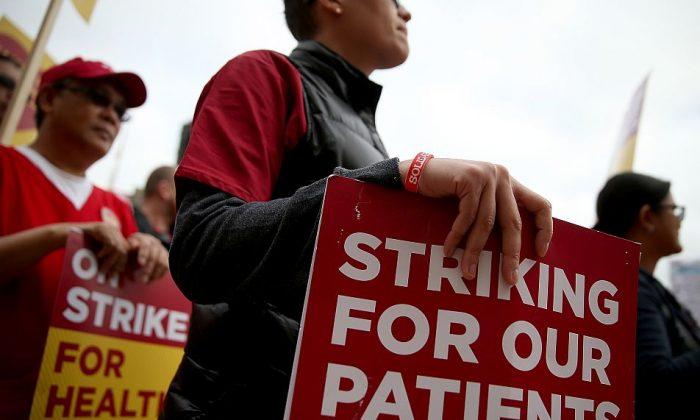America’s competitive edge has eroded year after year, now losing its rank to Switzerland. The United States held first place on the Global Competitiveness Index in the years up to 2008–2009, but now ranks seventh place, according to the Global Competitiveness Report 2012–2013, published on the World Economic Forum (WEF) website.
The United States ranked second on the 2009–2010 index, fourth on the 2010–2011 index, and fifth on the 2011–2012 index, losing by more than one rank from 2010 to 2012.
Ranking seventh on the 2012–2013 index with a score of 5.47, the United States is outranked by Switzerland (No. 1 at 5.72), Singapore (No. 2 at 5.67), Finland (No. 3 at 5.55), Sweden (No. 4 at 5.53), Netherlands (No. 5 at 5.50), and Germany (No. 6 at 5.48).
“The United States continues the decline that began a few years ago, falling two more positions to take 7th place this year. Although many structural features continue to make its economy extremely productive, a number of escalating and unaddressed weaknesses have lowered the US ranking in recent years,” according to the WEF Report.
What Makes America Tick?
The WEF report points to a number of positive factors that allow the United States to be among the top 10 in the world on the competitiveness list and retain some of its competitive advantages. An important factor is that America is considered to be the largest home-grown economy worldwide, despite suffering from persistent unemployment and a stagnant housing industry with housing prices still in the dumps.
“US companies are highly sophisticated and innovative, supported by an excellent university system that collaborates admirably with the business sector in R&D,” according to the WEF report.
However, the factors that ail the country are growing, as the populace is rapidly losing trust in the U.S. political establishment, be they local, statewide, or federal. Besides, Wall Street distrust by the public and investors has not disappeared, and the ups and downs of the stock market are an indication of that sentiment.
“Wall Street insiders have betrayed ordinary investors again and again over the past 15 years. … Americans are pulling [out] of the stock market because of poor returns and fears, as underscored by the Facebook IPO, … the game is rigged against the little guy,” according to the Policy Shop website.
Distrust between the U.S. government and U.S. business leaders hampers a cooperative environment, given the cronyism between government officials and Wall Street insiders, which has been highlighted by a number of recent articles, including a Sept. 5 Bloomberg Business Week article.
According to the WEF report, “a lack of macroeconomic stability continues to be the country’s greatest area of weakness,” one of the major issues dragging down the United States year after year.
What is troubling to the WEF is that American youth have difficulties finding a job, while economic disparity between different races and inequity between the social classes are becoming more pronounced.
Doing business in the United States is affected by an inefficient government bureaucracy, tax rates and regulations, access to financing, and obstructive labor laws. The United States continues to be vulnerable into the near future and possibly in the long term, which could affect economies worldwide.
“Despite growing its overall competitiveness score, the United States continues its decline. … On a more positive note, the country still remains a global innovation powerhouse and its markets work efficiently,” according to a Sept. 5 WEF news release.
America’s Affluence at Risk
“For the first time in decades, the business environment in the United States is in danger of falling behind the rest of the world. … A fundamentally weakened U.S. economy is not only an American problem but also a global risk,” according to a January report published on the Harvard Business School website.
Almost three-fourths of survey respondents to a Harvard Business School survey on U.S. competitiveness believe that America’s competitiveness will deteriorate further by the end of 2014.
The concern is for American workers who have fewer options in U.S. companies. U.S. companies can outsource to foreign countries where labor is cheaper, lay off people, cut expenses, mechanize procedures, and much more, while the employee may have to work more hours for less salary.
“Workers, in contrast, have limited mobility and few good alternatives, especially if jobs are scarce and their skills are not world-class. The respondents expect severe pressure on American living standards,” according to the Harvard report.
The survey found that people employed in the financial sector, recreation, restaurants, hotels, real estate, construction, and utilities were less pessimistic than those whose jobs could be performed in any country and location, such as people from the manufacturing, information technology, and environmental products sectors.
Most people foresee a bleak future for America’s competitiveness and associated employment opportunities, especially since there are more companies considering moving operations offshore than foreign companies moving into the United States.
When it comes to outsourcing, 42 percent of the companies that were contemplating outsourcing didn’t involve assembly line jobs, but research and development and engineering activities, according to the Harvard report.
Reasons were given by survey respondents for moving operations offshore, but not one pointed to the domino effect, that is, when people are unemployed, they won’t be able to buy the products, even if the company produced them offshore and could sell them at a cheaper price.
“Respondents point to America’s tax code, political system, K-12 education system, macroeconomic policies, legal framework, regulations, infrastructure, and workforce skills as the greatest current or emerging weaknesses in the U.S. business environment,” according to the Harvard report.
The process of America regaining its stellar competitiveness and returning to its number one position will be steeped in much soul searching. What is important to understand is that it is both government and businesses that must share the blame for America’s declining competitiveness.
Businesses lobbied the government officials, dangling future job prospects before their eyes, so officials produced regulations that provided businesses with many benefits.
“Corporate leaders have relentlessly pushed for loopholes and subsidies that serve narrow self-interest. Part of the business agenda for U.S. competitiveness is to stop taking actions that benefit one’s own firm but, collectively, weaken America’s business environment,” the Harvard report advised.
Winners and Losers in the Competitiveness Game
“With six of the ten best-performing countries, Northern and Western Europe is a competitiveness hotspot. … The lack of competitiveness of the Levantine and North African countries is worrisome,” the WEF report states.
Burundi, with a score of 2.78, is ranked by the WEF as the least competitive from among 144 countries. Burundi is preceded by Sierra Leone with a score of 2.82; Haiti and Guinea, tying with a score of 2.90 each; and Yemen with a score of 2.97.
Transportation and electricity infrastructure are a problem in Latin America, the Caribbean, and sub-Saharan Africa, keeping countries in that region from receiving an upgrade in their competitive rankings. Middle East countries are saddled with a 10.3 percent unemployment rate, with youth and women the most affected by unemployment.
In the European Union (EU), the Southern (Greece, Italy, Portugal, and Spain), Central, and Eastern European countries are the least competitive in that region. According to the WEF, “overall, low levels of productivity and competitiveness do not warrant the salaries that workers in Southern Europe enjoy and have led to unsustainable imbalances, followed by high and rising unemployment.”
The Epoch Times publishes in 35 countries and in 19 languages. Subscribe to our e-newsletter.




Friends Read Free